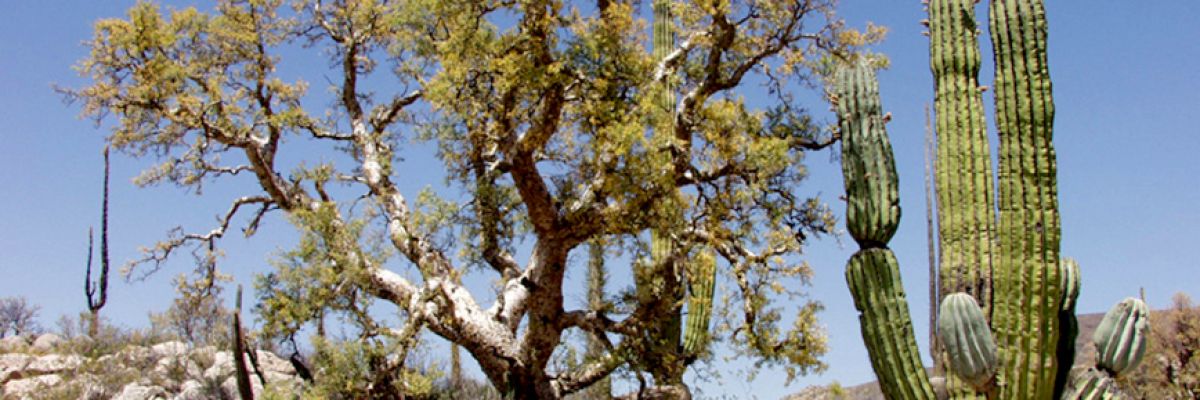
I wanted to get far from the madding crowd, so on a Friday I lit out for Anza Borrego Desert State Park, two hours from San Diego. From the east-west highway I turned south onto a narrow paved road, then west onto a rutted and rocky dirt road, which ended at a small parking area. No one else was around.
There was no trail to follow, so I went up a dry wash, hiking three miles over an alluvial fan and another three into a deep canyon, where I had to scramble over dry falls and through boulder fields. My goal was the rare elephant tree, which is neither a tree nor elephantine. It is a large bush the fat trunk of which looks a bit like the leg of an elephant. The guidebook said a hundred specimens of the bush could be found at the head of the canyon.
Overnight in the desert
I had made a late start and did not reach my goal by nightfall, so I pitched the tent on level sand and cooked ramen as darkness enveloped me. On the way in I had seen human tracks, but they were old. There also were new tracks that were large, round, and clawless: mountain lion. I had every reason to believe that I was being observed, and I did not want to remain outside the tent any longer than necessary. I ate quickly, eyeing the canyon walls, looking for an ominous silhouette. My hunting knife gave only modest comfort. I figured I could win any fight, but at what cost? I knew a big cat would not bother me if I were in the tent.
Throughout the night I kept the flap open for ventilation. Periodically I woke to watch the stars and to listen. Nothing. No wind, no footsteps, no chattering birds, no howls. It was as though the world had stopped and all life, even all natural forces, had gone into suspended animation.
At first light I broke camp and headed down the canyon, deciding not to climb the extra mile for a look at the elephant trees. They would be there next time. Back at the car I changed clothes and washed as best I could with a wet cloth. Refreshed and relaxed by my brief time amid solitude and silence, I headed for the highway. The spell of the wilderness was broken as I came upon choking clouds of dust and mechanical roars.
A swarm of noisy activity
I was passing through the Ocotillo Wells State Vehicular Recreation Area, a large tract of desert land reserved for dirt bikes and dune buggies. On this holiday weekend there were thousands of them. On either side of the road, set back fifty and a hundred yards, were encampments of RVs, trailers, and pickups, gathered in circles like the old wagon trains. The encampments stretched to the horizon. Once, when I used to pilot an airplane, I flew over this area on a Thanksgiving weekend and was astonished to see that the normally empty desert had become not one but several cities, as densely populated as real cities near the coast, but these cities would be packed up and gone within days.
As I drove through the recreation area, I noted that for each street-legal vehicle there were one or two off-road vehicles, and they all seemed to be in motion at once. Most were driven by children or teenagers wearing helmets and garishly designed riding outfits. Some were driven by adults.
As I moved down the paved road at fifty miles per hour, keeping pace with me on the soft shoulder on the opposite side was a middle-aged man in a dune buggy. He and other all-terrain vehicle riders were in a mad, crisscrossing rush across the desert floor, dodging one another and creosote bushes, making incessant noise, throwing up sand clouds, and leaving deeply rutted trails. I found it depressing.
Dominion over the earth
The desert is a fragile place. Drive on a beach at low tide, and your tracks will be gone by morning. Drive on the desert, and your tracks will live longer than you will. It is said that a desert jeep trail, if left fallow, still will be drivable a century hence, so slow is the obliteration caused by natural forces in a land of little rain.
So that was part of my complaint: the despoilment of the land. But more than that bothered me. I also was annoyed at the off-roaders for the cacophony, much as I would be annoyed at someone frolicking and making noise in church. Certain places call for reverence and silence. I understand the allure of noise and dust clouds and speed, but not everything is appropriate everywhere.
I never have considered myself an environmentalist, partly because most people who claim that label think the best way to preserve the environment is to get rid of humans through contraception and abortion. Does that make me a conservationist instead? Hard to say.
I acknowledge that God gave man dominion over the earth (“fill the earth and subdue it,” Gen. 1:28), but, just as every right has a correlative duty, so that dominion puts limitations and responsibilities on man. Can a Catholic, in conscience, defend all uses of the desert—or should he oppose some? Is there no limit to what may be done on land that has little ability to recuperate? At what point should our desire to play be superseded by our duty to preserve?
The Lord asked Jonah, “Do you do well to be angry?” (Jon. 4:4). Do I do well to be angry at the off-roaders? Am I right in sensing there is something profoundly un-Catholic about their use (or abuse) of the desert? Job thought things over under his bean plant. Perhaps I will think this over under an elephant tree.



